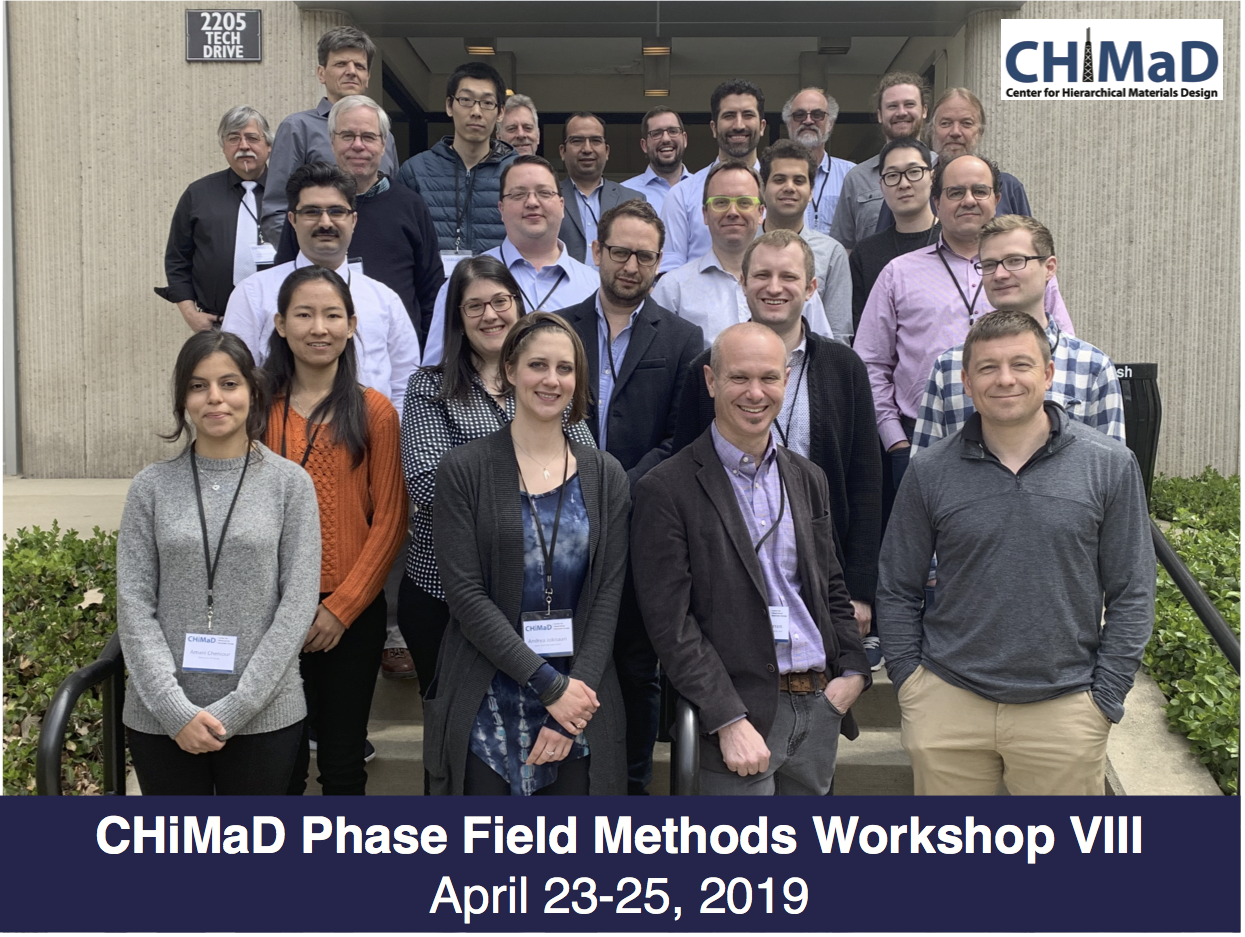The Phase Field Community Hub
github.com/wd15

Daniel Wheeler


Acknowledgements

- Trevor Keller, NIST
- Stephen DeWitt, U. of Michigan
- Andrea Jokisaari, INL
- Daniel Schwen, INL
- Jon Guyer, NIST
- Larry Aagensen, INL
- Olle Heinonen, ANL
- Mike Tonks, U. of Florida
- Peter Voorhees, Northwestern
- Jim Warren, NIST
- David Montiel, U. of Michigan






PFHub team
Overview
- What are the benchmarks and PFHub?
- Motivation
- Benchmark design
- PFHub design / data sharing
- Community organization
- How can you help?
What Is the Benchmarking Effort?
- Improve sharing between phase field code developers and practitioners
- Develop benchmarks to verify and validate codes
- Build a site to gather and display benchmark data
Choose The one True PHASE Field Code?
inspired by the μMAG effort
What is PFHub?
- A place to:
- display benchmark specs
- upload, validate and compare benchmark results

Benchmark 7: MMS Allen-Cahn
Motivation
- Unite phase field code developers
- Multiple disconnected efforts
- Many phase field codes
- Find a common code?
- Quality assurance for phase field codes
- Difficult to assess applicability
- Difficult to setup for novices and experts alike
- Difficult to validate and verify
- Long term goal of incorporating phase field more confidently into ICME via quantitative models
What Makes a Good Benchmark Suite?
-
Robust
- Widely applicable (intelligible, modest resources)
- Well determined functional specification
- Fully abstract specification
-
Validating, verifying and confirming
- Test reliability, correctness and accuracy of
- Numerics (accuracy, precision, performance)
- Physical representation (terms, coupling, geometry, boundaries)
- Operation (usage, reproducibility, system)
- Identify good metrics for comparison
- Validation hierarchy (unit problems to complete system)?
- Uncertainty?
- Test reliability, correctness and accuracy of
-
Relevant
- Educational and/or archival value
- Physical/technical/community interest
- Unsolved challenge?
Model V&V versus software V&V
"models are most useful when they are used to challenge existing formulations, rather than to validate a predetermined result"
Verification, Validation, and Confirmation of
Numerical Models in the Earth Sciences, Science (1994)
The Benchmarks
| Benchmark | Paper | Release | Uploads | Variations | Equations | Order | Geometry | Coupled | Transient |
|---|---|---|---|---|---|---|---|---|---|
| 1. Spinodal Decomposition | Cahn (1961) | 1 | 52 | 4 | 1 | 4th | Grid / Irregular | No | Yes |
| 2. Ostwald Ripening | Zhu (2004) | 1 | 25 | 4 | 5 | 4th | Grid / Irregular | Yes | Yes |
| 3. Dendritic Growth | Karma & Rappel (1998) | 1 | 11 | 1 | 2 | 2nd | Grid | No (*) | Yes |
| 4. Elastic Precipitate | Jokisarri (2017) | 1 | 12 | 8 | 2 | 4th | Grid | Yes | No |
| 5. Stokes Flow | beta | 0 | 2 | 2 | 2nd | Grid / Irregular | No | No | |
| 6. Electrostatics | Guyer (2004) | beta | 8 | 2 | 2 | 4th | Grid / Irregular | Yes | Yes |
| 7. Allen-Cahn MMS | beta | 7 | 3 | 1 | 2nd | Grid | No | Yes |

BEnchmark Revision History
SUBMIssion Guidelines

Upload Form

Results for Benchmark 3


| Code | Uploads | Contributors (Year) | Language | Person-Years |
|---|---|---|---|---|
| Moose | 59 | 222 (?) | C++ | 128 |
| FEniCS | 14 | 163 (39) | C++ | 112 |
| MMSP | 10 | 10 (0) | C++ | 5 |
| PRISMS-PF | 9 | 12 (1) | C++ | 9 |
| Sfepy | 8 | 25 (6) | Python | 20 |
| Custom | 7 | |||
| FiPy | 7 | 20 (3) | Python | 6 |
| HiPerC | 1 | 2 (1) | C | 1 |
| OpenPhase | 0 |
Codes
PFHUb DESign
- Statically generated, no content management system
- Delegate back-end functionality to external services
- Data upload, analysis and display on client
- Upload using GitHub pull requests


How we build CMS free websites



PFHub design
github
staticman
Jekyll
DATA app
Figshare
backblaze
s3
Mdf
Upload Schema
- Benchmark ID
- Data
-
Media links
-
Data file links
-
Resource usage
-
- Metadata
-
Authors
-
Hardware
-
Implementation
-
Summary
-
Timestamp
-
REView Process
github PR
Surge

TRAVIS CI
REVIEWER
USER
Staticman
Community Organization
- Semiannual workshops since 2015 at CHiMaD
- 3 Hackathons to test new benchmark problems
- Install-a-thon
- Upload-a-thon
- Monthly chat meetings
- Slack, Gitter channels
- Code of conduct

October 15, 2015 – Northwestern University
Install-a-thon
Survey Monkey: https://bit.ly/2nDYHwj
- 17 participants
- 35 questions

The installation is quite long, probably 2-3 hours, even if everything goes right. There's a big gap in the documentation. The installation directions are good, but there aren't any directions about what to do once the code has been installed and the test suite is complete. I simple walkthrough...
Comments
educational usage
- Mike Tonks uses the benchmarks for teaching
- Feedback
- Guidelines for determining Δx and Δt
- Mesh construction help for curved boundaries
- More uploads to help with comparisons
- Fewer variations to each problem
- Develop Software Carpentry style phase field workshop based on the benchmarks?
- PFHub provides links to implementations
publications



January 2017
June 2018
September 2019
How can you Help?
- How to generate more compelling result comparisons?
- How to encourage more uploads?
- How to improve engagement for current and future benchmarks?
Please submit your uploads!
todo
- Add more details about benchmarks such as their historic references and derivations
- Show the upload page and possible talk through uploading a CSV file
- expand on mumag?
The Phase Field Community Hub
By Daniel Wheeler
The Phase Field Community Hub
- 2,966



